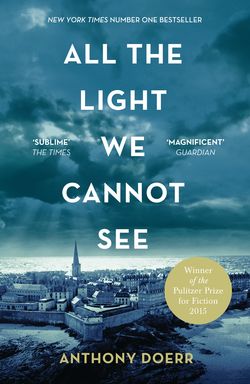Читать книгу All the Light We Cannot See - Anthony Doerr, Anthony Doerr - Страница 14
Cellar
ОглавлениеBeneath the lobby of the Hotel of Bees, a corsair’s cellar has been hacked out of the bedrock. Behind crates and cabinets and pegboards of tools, the walls are bare granite. Three massive hand-hewn beams, hauled here from some ancient Breton forest and craned into place centuries ago by teams of horses, hold up the ceiling.
A single lightbulb casts everything in a wavering shadow.
Werner Pfennig sits on a folding chair in front of a workbench, checks his battery level, and puts on headphones. The radio is a steel-cased two-way transceiver with a 1.6-meter band antenna. It enables him to communicate with a matching transceiver upstairs, with two other anti-air batteries inside the walls of the city, and with the underground garrison command across the river mouth.
The transceiver hums as it warms. A spotter reads coordinates into the headpiece, and an artilleryman repeats them back. Werner rubs his eyes. Behind him, confiscated treasures are crammed to the ceiling: rolled tapestries, grandfather clocks, armoires, and giant landscape paintings crazed with cracks. On a shelf opposite Werner sit eight or nine plaster heads, the purpose of which he cannot guess.
The massive staff sergeant Frank Volkheimer comes down the narrow wooden stairs and ducks his head beneath the beams. He smiles gently at Werner and sits in a tall-backed armchair upholstered in golden silk with his rifle across his huge thighs, where it looks like little more than a baton.
Werner says, “It’s starting?”
Volkheimer nods. He switches off his field light and blinks his strangely delicate eyelashes in the dimness.
“How long will it last?”
“Not long. We’ll be safe down here.”
The engineer, Bernd, comes last. He is a little man with mousy hair and misaligned pupils. He closes the cellar door behind him and bars it and sits halfway down the wooden staircase with a damp look on his face, fear or grit, it’s hard to say.
With the door shut, the sound of the sirens softens. Above them, the ceiling bulb flickers.
Water, thinks Werner. I forgot water.
A second anti-air battery fires from a distant corner of the city, and then the 88 upstairs goes again, stentorian, deadly, and Werner listens to the shell scream into the sky. Cascades of dust hiss out of the ceiling. Through his headphones, Werner can hear the Austrians upstairs still singing.
… auf d’Wulda, auf d’Wulda, da scheint d’Sunn a so gulda …
Volkheimer picks sleepily at a stain on his trousers. Bernd blows into his cupped hands. The transceiver crackles with wind speeds, air pressure, trajectories. Werner thinks of home: Frau Elena bent over his little shoes, double-knotting each lace. Stars wheeling past a dormer window. His little sister, Jutta, with a quilt around her shoulders and a radio earpiece trailing from her left ear.
Four stories up, the Austrians clap another shell into the smoking breech of the 88 and double-check the traverse and clamp their ears as the gun discharges, but down here Werner hears only the radio voices of his childhood. The Goddess of History looked down to earth. Only through the hottest fires can purification be achieved. He sees a forest of dying sunflowers. He sees a flock of blackbirds explode out of a tree.
